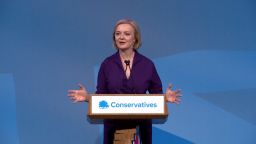Liz Truss has taken over from Boris Johnson as prime minister of the UK, with an inbox that may leave her wondering why she wanted the job in the first place.
From the worst cost-of-living crisis in a generation to public services simply not working, Truss will have to plug major holes with a sluggish economy and a promise to introduce no new taxes.
And she will have to do it while leading a Conservative Party that is bitterly divided and far from guaranteed to support her vision for the country.
Cost of living
Inflation rose above 10% in July for the first time in 40 years. It was driven by the?rising cost of energy and food. Average household energy bills have risen 54% already this year and are forecast to go even higher.
This is bad news not just for households but also businesses that the government had to bail out during the pandemic, many of which will simply not be able to pay the bills and will be forced to close without support.
A poor economy
Compounding Truss’ woes is the fact that the UK is on track for a recession by the end of the year, according to the Bank of England. GDP dropped by 0.1% in the second quarter of this year and analysts believe the third quarter will put the country into a technical recession.
And on Monday, in a signal of the serious challenges ahead, the British pound dropped 0.3% to its lowest level against the US dollar since 1985, before recovering slightly.
Public services falling apart
Lots of things in the UK simply seem to be failing at the moment. Waiting times to receive health care are at their longest in recent history. This is in part because of the pandemic putting the National Health Service under greater strain, but it is also because of staff shortages and insufficient funding, the British Medical Association says.
There are similar staffing and funding problems in social care, schools, universities and local government.
Strikes
Thoughout this year, transportation workers, journalists, lawyers, refuse workers and postal workers have gone on strike. In many of the cases, union bosses have blamed the government for failing to meet their demands and break the deadlock.
These strikes will have an obvious knock-on effect for productivity and economic growth, something Truss has vowed to improve in her economic plan.
International headaches
Of course, Truss will also enter office amid a complicated global situation. Ukraine is still under Russian invasion, China is still threatening Taiwan. And then there’s the mess of Brexit, which is still causing huge problems both in Britain and overseas.
Truss, who is still foreign secretary until she starts her new gig, knows these problems well but may find that being PM requires more diplomacy than she has often shown in her current role, where she has taken a hard line with Europe and a hawkish position on both Russia and China.
Her own MPs
Arguably the biggest danger for Truss comes from her own Conservative MPs, who are now rather well versed in regicide. Truss has not outlined how she plans to address any of the issues above and her parliamentary colleagues are far from confident she has the answers.
Privately, some say she could even be forced out of office before the next election, which would mean the Conservative Party having five leaders since taking office in 2010.
Truss came second to her rival Rishi Sunak when Conservative MPs reached the last round of voting before putting the final two candidates to the party. Many MPs believe she is simply not up to the job and that her aggressive campaign has alienated even some of the most loyal Conservatives.
If she fails to impress them in the next few weeks, Truss could find support for her plans lacking in parliament – and if the past five years have taught us anything, it’s that this can be the kiss of death for a sitting prime minister.


